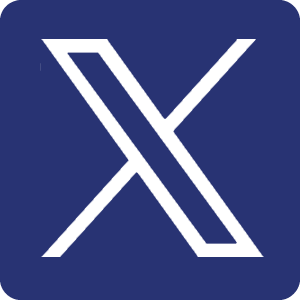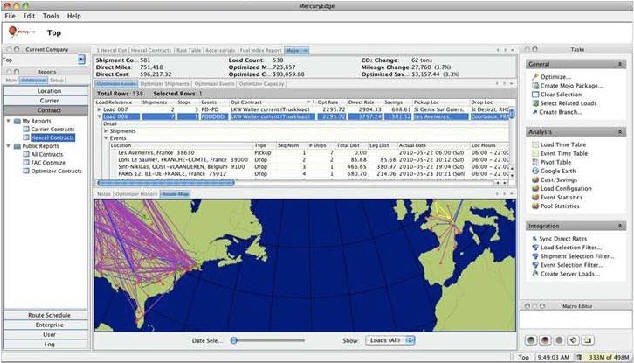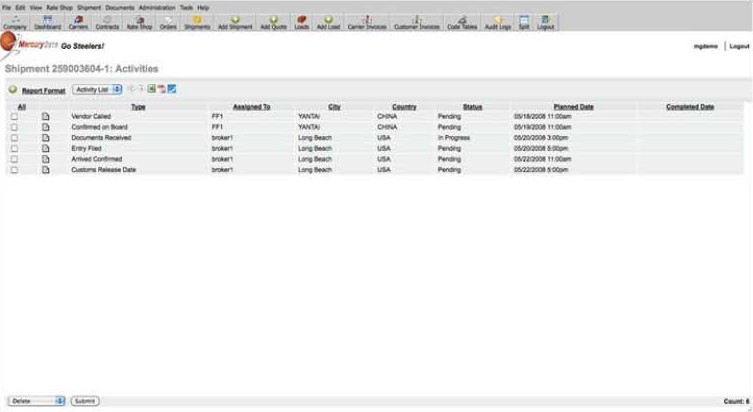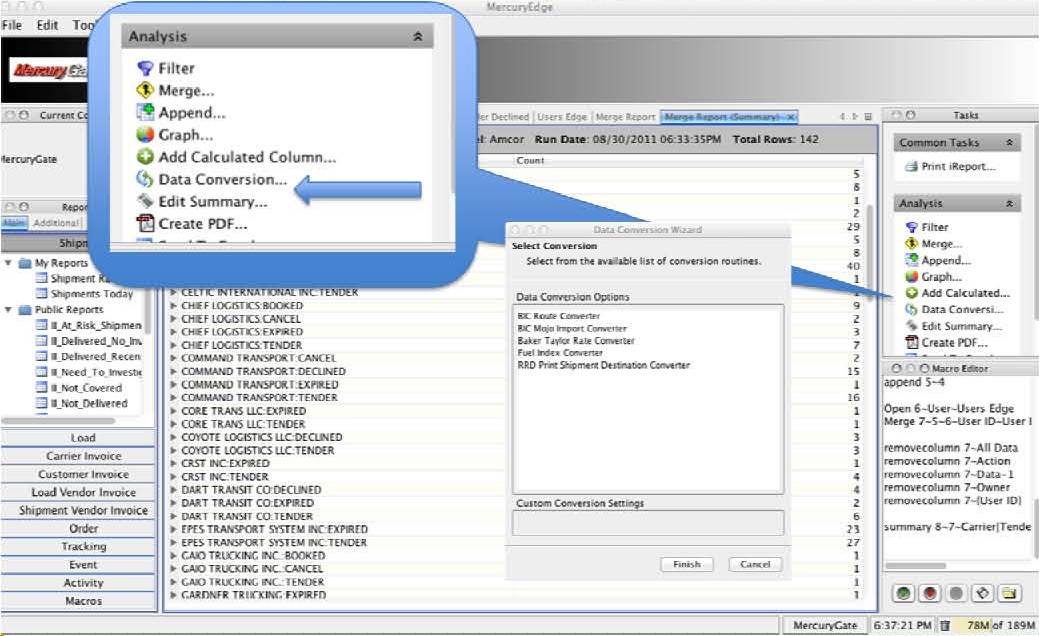MercuryGate Benefits Logistics Service Providers
Cary, North Carolina USA Site Visit
January 18, 2012
By
Evan Armstrong
Key Personnel:
Monica Wooden, CEO
Steve Blough, President
MercuryGate Overview
Founded in 2000, Cary, North Carolina based Transportation Management Systems (TMS) developer MercuryGate International has built a sizable business. With a staff of 75, it generated revenue of just over $17 million in 2011. More impressive, however, is how MercuryGate’s web-native TMS solutions have generated significant market demand. Its customer base now totals over 130 third-party logistics providers (3PLs) and freight brokers and 50 shippers. In 2010 and 2011 alone, MercuryGate added 82 new customers. It is planning to add an additional 48 customers in 2012 pushing revenues to approximately $22 million.
From our ongoing survey work of 3PLs and freight brokers, we have identified three key factors which have driven MercuryGate’s rapid growth: 1. The breadth of its offering, allowing logistics providers to use the single MercuryGate application for all transportation planning and execution functions, 2. As a web-native hosted solution with interfaces to multiple enterprise resource planning and warehouse management systems it can be deployed rapidly, and 3. Its flexible pricing model allows startups to affordably use the software and larger organizations to reduce the risk of a large up-front investment. MercuryGate’s key 3PL accounts include: A&R Global Logistics, BNSF Logistics, GENCO, Kenco, MIQ Logistics, Mode Transportation, OHL, Ryder, and Transportation Insight. Additionally, it counts Baker & Taylor, Cargill, Celestica, HD Supply, Jabil, McLane, R.R. Donnelley, Raytheon, and Siemens as key shipper accounts.
Key TMS Functionality
We have seen MercuryGate’s TMS in use at several operations and were provided with additional system demonstrations from its current TMS release. MercuryGate has built the following functionality into its TMS which has significant advantages for 3PLs and freight brokers:
- Buy (carrier) and sell (shipper) side system functionality is inherent to the software.
- The system architecture uses a hierarchical company and account structure which allows inheritance as well as modeling of appropriate levels of access and reporting for complex configurations.
- The TMS has the ability to allocate transportation costs from consolidated shipments and truckloads back to individual shippers/3PL customers.
- The “Carma” carrier management module provides for CSA compliance management and interfaces to Registry Monitoring Insurance Services (RMIS), Transcore and Carrier 411 for carrier insurance and operating authority information.
- Carrier service performance tracking and reporting are standard.
- Easy to use “Mojo” order to shipment mode conversion/optimization provides users with the ability to consolidate and optimize orders and shipments between multiple modes including intermodal rail and small package/parcel.
- Mojo uses actual rated shipment costs, handling, accessorial charges, and surcharges for optimization versus benchmark costs.
- Mojo and “MercuryEdge” can be used separately for transportation modeling to support customer request for proposal bid work.
- Expanding international transportation management functionality including multi-leg shipment optimization and routing.
- The TMS provides users with historical carrier rate lookups by lane and other user defined parameters.
- It supports individual freight broker load posting boards.
- MercuryGate integrates with Transcore, Internet Truckstop, MercuryGate’s “FreightFriend”, and other websites to search for carrier capacity and to post available loads.
- The TMS has easy to use interfaces and functionality for performing customer rate quotes.
- Well detailed alerts and filters for key shipment service performance and back office processing milestones are incorporated.
- Significant reporting capabilities for overall, customer, lane, and carrier profitability analysis are included.
- It has a known software upgrade path via its hosted environment which releases new versions of its TMS every eight weeks.
- MercuryGate’s TMS workflows and screens are easily customizable allowing 3PLs to rebrand the TMS as their “own” software.
- The core TMS supports 12 different languages.
Mojo Transportation Optimizer
Traditionally many 3PLs developed proprietary TMS to manage their transportation operations (day-to-day transportation execution) and would often integrate their systems with a commercial software vendor’s transportation planning system such as JDA/i2 or Oracle to add transportation mode and route optimization functionality. By comparison, MercuryGate’s Mojo optimizer was developed in house and resides in its MercuryEdge tool.
Mojo is a many-to-many transportation network optimizer which means it can consolidate inbound and outbound orders into larger shipments and route them via the best transportation mode across multiple shipper and consignee locations, cross docks, and lanes. It determines the best carrier and mode routings using actual calculated rates and provides users with the ability to develop optimization strategies based upon multiple parameters including:
- Multiple transportation modes including parcel
- Air, ocean, and rail schedules
- Maximum out of route miles and cluster strategies
- Reverse stop constraints
- Continuous move stop-in-transit restrictions
- Equipment constraints and driver hours of service limits
- Pick-up and delivery windows
- Hours of operation limits
- Dock schedules and availability
- Vehicle capacity and transit times
- Average ground speed
- Time to service stops
- Vehicle loading methods
- Pool point hold times
- Fuel surcharge attributes
Mojo can simultaneously optimize inbound and outbound loads and optimize transportation equipment based upon positioning schedules. It can create and archive multiple alternative transportation plans using different parameters prior to being executed. Mojo also has built in functionality to calculate the carbon footprint and emissions reductions using Mojo’s CO2 calculator. Another differentiating feature of Mojo is its ability to communicate to a transportation planner why certain shipments were not part of an optimization plan.
Mojo is accessed as a Java Swing thicker-client application versus a pure internet browser application. According to MercuryGate, this configuration increases its functionality and speeds up its processing time. In our demo, we saw Mojo optimize 221,000 load possibilities in 11.48 seconds.
MercuryGate Mojo Optimizer Screenshot







